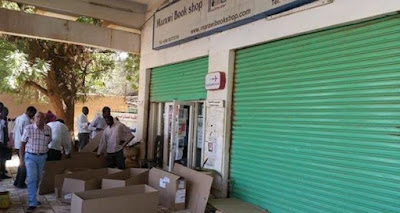Mohamed Mahjoub, a member of the leadership council of the opposition National Consensus Forces (NCF) alliance, spoke dismissively of the proposal forwarded by the Popular Congress Party (PCP) regarding reform of the requirements for marriage. The issue which has proven to be the most hotly contested among the proposals that came out of President Bashir’s national dialogue process, was described by Mahjoub as a diversion from the ‘serious’ business of public freedoms. The comment is a sorry demonstration of politics missing its point.
The PCP put forward a series of proposals which it said were drafted by the late Hassan al-Turabi and dubbed ‘the freedoms document’. One of Turabi’s points affirms the freedom of “men and women to marry by consensual contract directly between them or through agency”. The Salafi establishment in Sudan was aghast. Turabi’s apparently benign formulation essentially proposed abolition of the requirement for a male guardian over a woman to consummate marriage. Another Turabist line that proved similarly contentious granted “every human being the right of choosing the views he wishes to subscribe to by way of religious belief or doctrine, besides the right to practice any worship rituals, celebrate religious festivities and establish places of worship. Nobody shall be coerced to believe in a certain religion or creed, and none shall be prevented from engaging in debate according to his belief and opinion”. In this typically convoluted formulation the sheikh was attempting to strike the apostasy charge and related provisions off the law book.
The religious establishment immediately recognised what was coming its way. The Islamic Jurisprudence Academy, a semi-governmental body of Islamic scholars, announced its opposition to the proposals. Members of the council said the proposals constitute a legal permission of apostasy and will only lead to discord and conflict. The council issued a formal fatwa saying the proposals were in contradiction with sharia and are effectively in the realm of haram. The Wahhabi Ansar al-Sunna said the same stressing that the requirement for a guardian over a woman in marriage actually preserves the dignity of women. Ismail Osman al-Mahi, the leader of the group, said the permissive proposals would “open the door wide for shiite proselytisation, atheism and the establishment of temples in the country”. Star preachers from the Salafi bloc announced from their mosque pulpits a campaign against Turabi’s document. Abd al-Hai Yusif raged against the proposals. “They want to amend what the Prophet’s traditions have approved”. Of course, he was particularly venomous when it came to marriage. “They want to amend and change and blasphemy as they please and they want the imams to remain silent”. The Salafi preacher ignored Muslim etiquette and directed his anger at the dead Turabi. “These proposals were made by some who have since died and are in the grave. Some parties want to force the ideas of the dead on the community of Muslims, blasphemous ideas born out of fraud, distortion, acceptance of some holy dictates and the dismissal of others.”
Turabi is no longer around to respond. He usually did not anyway to such verbal aggression. Abd al-Hai Yusif, educated in the dogmas of Wahhabism, is incensed by Turabi’s creole approach to sharia. Whatever Turabi’s specific motivations for putting forward what he definitely knew would be threatening proposals, the sheikh is proving the capacity to rattle things from the grave while Mohamed Mahjoub and his likes rejoice in the exercise of futility. For the past ten years or so of his life, Turabi went to great lengths to rework his understanding of liberties in the private and public spheres from an Islamic perspective. Following his own sunna in ignoring details that do not exactly fit his standpoint on any particular issue, Turabi did not deliver a cogent ‘theological’ argument to back his proposals. From the viewpoint of Abd al-Hai and his associates they are nevertheless dangerous, in the first instance because they emanate from within the Islamic rank and not from the barricades of the defeated secular intelligentsia. Turabi’s strand of ‘Islamic’ feminism is a more a political initiative than a body of thought through postulates.
In keeping with his legal training, Turabi’s approach to emancipation has always been a legal one, and his current proposal on the reform of the 'marriage contract' as he preferred to say is his posthumous contribution to the issue. What the late sheikh threw at the religious establishment is an attempt at reversing by letter of law centuries of patriarchal oversight over women’s choices. The Islamic Jurisprudence Academy did not frontally challenge Turabi’s theological innovation but chose instead to argue that his proposal contravenes “sharia-supported established custom in Sudan”. Even Abd al-Hai, the self-proclaimed puritan, could not but surrender to some of Turabi’s logic. He argued that sharia already conditions marriage with a woman’s consent. “The law and the Prophet’s Sunna both determine that no (marriage) contract is valid without consent,” he told worshippers in Khartoum’s Jabra last Friday. Turabi’s proposal of course, al least formally, takes the patriarchal cap off that consent. Mohamed Mahjoub and the NCF politicians in their haste could not grasp the ‘revolutionary’ element in Turabi’s posthumous poke at rijal al-Din (men of religion). I fear that they probably agree with the conservative position of their fellow rijal from the religious establishment on this one issue and would not be exactly happy if their womenfolk, bareheaded or in a hijab, suddenly had the right to marry themselves off to the next lover without recourse to patriarchal license.





